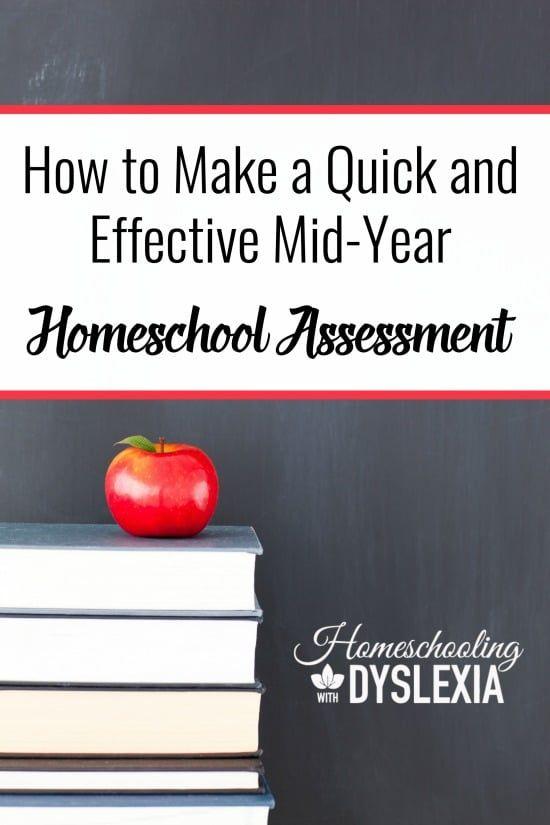Feeling off track in your homeschool? Make a quick, mid-year homeschool assessment to put your mind at ease.

I talk to a lot of homeschool moms. We come from all walks of life but we all have this one thing in common; we all feel like we’re not ‘doing enough’.
‘Doing enough’ is a vague mixture of ideals, comparing ourselves to the homeschool family next door and counting the unfinished lessons in our school books.
More thoughts on ‘doing enough’ in your homeschool.
The break for the holidays is a perfect opportunity to take a fresh look at what is working and what isn’t in your homeschool. Here’s how I do a quick mid-year homeschool assessment:
Academic Homeschool Assessment
Academic assessments are pretty straight-forward:
- Compare lessons completed to how many days you’ve been doing school: how closely on track are you?
- Look at grades or mastery: are they ‘getting it’ or do they seem to be struggling?
- How do the kids feel about how things are going: are they excited, content, or dreading each subject?
In my earlier homeschool days I was pretty quick to throw out a curriculum that wasn’t working and try another one. I think that that is just part of normal for homeschooling in the early days. We need to get a feel for our kids’ learning styles (and our own as the teacher) and we need to get a feel for different curricula.
These days, after homeschooling for over 20 years, I am more prone to alter a curriculum. Too much writing? Do some work verbally. Too much reading? Read out loud a few times a week. Progress too slow? Back off on some subjects to make time to double up on others. Read this post for more creative ways to modify your homeschool curriculum.
While it is important to assess the academic progress of our homeschooled kids, we also need to give room for our own kids’ individual strengths and weaknesses.
Several years ago, I was teaching two 10th graders and one of them loved, loved, loved history and despised his health class. He just had a natural affinity for history while health and nutrition simply didn’t interest him. The other 10th grader loved, loved, loved studying about health and nutrition, but despised studying history. Same curriculum – two different kids. Did I change either of these curricula? No.
In the same vein, not all kids are A students across the board. Some will naturally be inclined towards language arts and others towards math and science. Give room for these differences. You as the parent know your kids best and with some careful observation should be able to tell if your kids are working to their potential.
Successful homeschoolers will learn to find a balance between teaching to their kids’ preferred learning style and knowing when to push kids to work out side of their comfort zone.
Home and Schedule Assessment
There is no separating the home from the school in homeschool planning. If the home isn’t running smoothly, the school won’t run smoothly and vice versa.
Some questions to ask:
- How is the house running?
- What areas of home life need help: Cleaning? Laundry? Cooking? Time Management?
- How can these tasks be better delegated or managed?
At the beginning of every school year, I create a schedule for our homeschool. Once we are all on track, we tend to let go of the paper and work off of habit. Oftentimes after a school break (especially for holidays) , things tend to get off track and we go back to our paper schedule for a time.
If your home is out of order, take the time to list the things that are making you crazy and give yourself permission to take the time to get back in order. Think of life skills as a class and teach your kids to help!
Relationships Assessment
Homeschooling is far more than the pursuit of academic excellence. While homeschooling statistically lends itself to academic success, the character and relationships that are being formed and shaped every single day in our homeschools are right up there with academic skills – even more so in some ways. Consider the straight A-student with poor character compared to the C-student with a heart to serve and bless.
It is not uncommon for relationships to have peaks and valleys. As homeschool parents, it is our job to make sure that we are relating to all of our kids as best we can and to note when one kid or another is becoming distant from the family.
Things that have caused our relationships to suffer have been too much media (on all parts – parents and kids alike), being too busy, constant discipline issues that are unresolved, and the tension caused by mom and dad not focusing on their relationship. Read more about how we limit screen time in our home.
Benefits of Making a Mid-Year Homeschool Assessment
There is a lot to be gained from making a homeschool assessment.
- Refocus on your goals or change them if necessary
- Helps breathe new energy into your homeschool
- Helps you and your kids see the big picture goals
- Gives a sense of organization
Before you get back to school, take some time to ponder, make notes, and talk to your kids about their experience and make any changes you need to to get back on track towards your big picture homeschool goals.
More posts on Homeschool Planning:
Setting Homeschool Goals for Your Dyslexic Homeschooler





0 Comments